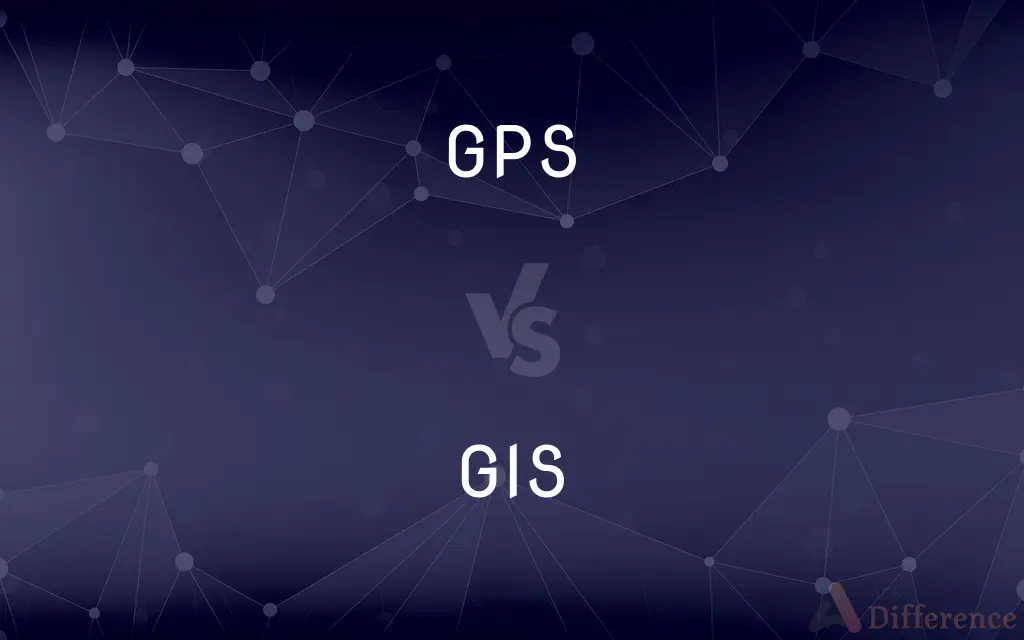GPS vs. GIS — What's the Difference?
Edited by Tayyaba Rehman — By Fiza Rafique — Published on December 15, 2023
GPS determines location using satellites; GIS manages and analyzes geographic data. Both involve spatial information.

Difference Between GPS and GIS
Table of Contents
ADVERTISEMENT
Key Differences
GPS, or Global Positioning System, is a satellite-based navigation system allowing users to determine their approximate location. In contrast, GIS, or Geographic Information System, is a software system that captures, manages, and presents spatial or geographic data.
The main function of GPS is to provide accurate location coordinates anywhere on Earth. GIS, on the other hand, is more about handling, manipulating, and analyzing spatial data to produce meaningful information.
GPS relies on a network of satellites transmitting signals to receivers on the Earth's surface. GIS doesn't require satellites but rather works with data layers to produce maps and conduct spatial analysis.
In terms of application, GPS is commonly used in navigation, tracking, and mapping. GIS plays a crucial role in planning, decision-making, and resource management across various sectors.
While GPS primarily deals with pinpointing a singular location, GIS can visualize multiple types of data simultaneously, offering a broader perspective on spatial relationships.
ADVERTISEMENT
Comparison Chart
Primary Function
Location determination
Spatial data management and analysis
Reliance
Satellite signals
Data layers
Application
Navigation, tracking
Planning, decision-making
Components
Satellites, receivers
Software, spatial data
Data Visualization
Singular location
Multiple data layers simultaneously
Compare with Definitions
GPS
A device for pinpointing one's position.
Hikers often carry a GPS for safety reasons.
GIS
A system for managing geographic data.
The city planners used GIS to redesign the urban landscape.
GPS
A system for global navigation.
I used my GPS to navigate through the unfamiliar city.
GIS
A platform for understanding spatial relationships.
With GIS, we identified flood-prone areas in the town.
GPS
A satellite-based location identifier.
Without a GPS signal, I felt lost in the woods.
GIS
A tool for mapping and analysis.
Conservationists use GIS to monitor endangered species habitats.
GPS
A tool for real-time tracking.
The company tracks its delivery trucks using GPS.
GIS
A means of integrating multiple data layers.
GIS provided a comprehensive view of the environmental factors in the region.
GPS
A means of receiving satellite signals for location.
My GPS helps me find the fastest route to my destination.
GIS
Software for spatial data visualization.
GIS allows us to see patterns and trends in geographic data.
GPS
A navigational system involving satellites and computers that can determine the latitude and longitude of a receiver on Earth by computing the time difference for signals from different satellites to reach the receiver
GIS
Alternative spelling of jizz
Common Curiosities
What does GPS stand for?
Global Positioning System.
Can GIS work without GPS data?
Yes, GIS can work with various types of spatial data, not just GPS.
How does GPS work?
It uses satellite signals to determine a location on Earth.
Is GPS only for navigation?
No, GPS can also be used for tracking, mapping, and more.
What is the primary purpose of GIS?
Managing and analyzing geographic or spatial data.
How accurate is GPS?
With modern systems, usually within a few meters.
Can GIS visualize data in 3D?
Yes, many advanced GIS platforms offer 3D visualization.
Do all smartphones have GPS?
Most modern smartphones do come with built-in GPS.
Why is GIS important in urban planning?
It helps visualize and analyze spatial relationships, aiding decision-making.
Is GPS the only satellite navigation system?
No, there are other systems like GLONASS (Russia) and Galileo (EU).
Can GPS work indoors?
Typically, it's less accurate indoors due to signal obstructions.
How does GIS handle different data sources?
Through layering and integration of various spatial datasets.
What kinds of professions use GIS?
Planners, geographers, conservationists, and many more.
How do GIS and GPS interact?
GPS provides location data that can be managed and analyzed within a GIS.
What’s the most common output of GIS?
Maps, but also charts, graphs, and reports.
Share Your Discovery

Previous Comparison
Complete Metamorphosis vs. Incomplete Metamorphosis
Next Comparison
Irish Wolfhound vs. Scottish DeerhoundAuthor Spotlight
Written by
Fiza RafiqueFiza Rafique is a skilled content writer at AskDifference.com, where she meticulously refines and enhances written pieces. Drawing from her vast editorial expertise, Fiza ensures clarity, accuracy, and precision in every article. Passionate about language, she continually seeks to elevate the quality of content for readers worldwide.
Edited by
Tayyaba RehmanTayyaba Rehman is a distinguished writer, currently serving as a primary contributor to askdifference.com. As a researcher in semantics and etymology, Tayyaba's passion for the complexity of languages and their distinctions has found a perfect home on the platform. Tayyaba delves into the intricacies of language, distinguishing between commonly confused words and phrases, thereby providing clarity for readers worldwide.
















































